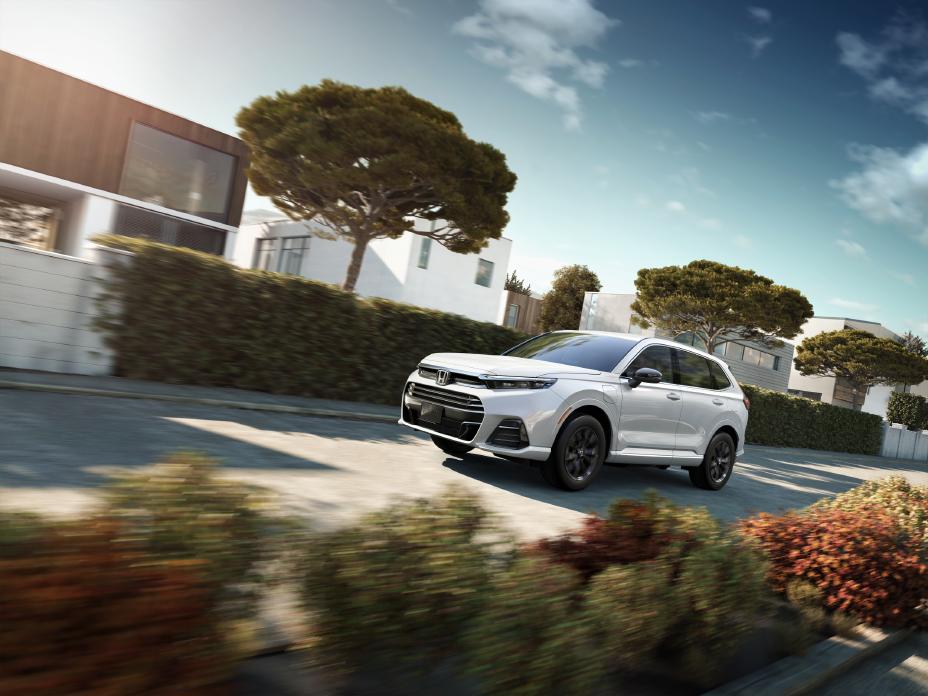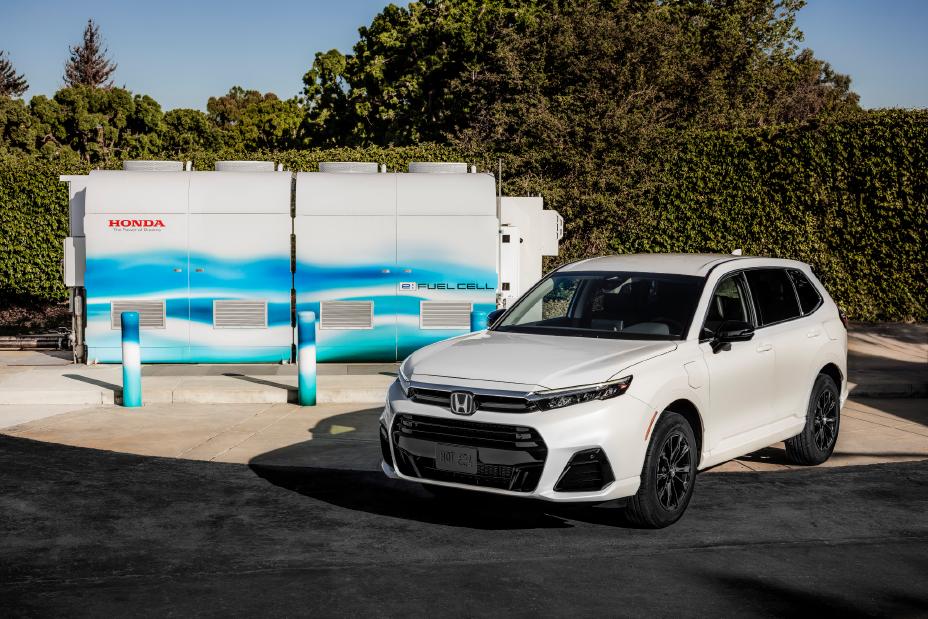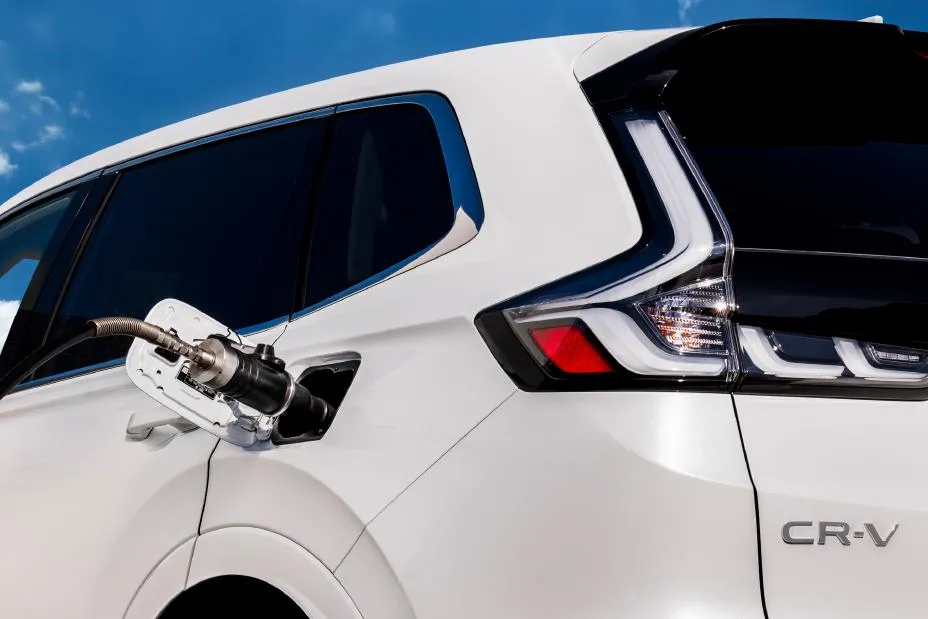
Honda’s popular CR-V compact crossover is now getting a hydrogen-powered plug-in hybrid version that will begin deliveries this year in California – the car allows you to recharge via Level 2 charging for quick trips, or rely on hydrogen power for long hauls.
Californians can drive the upcoming 2025 model via lease-only, and Honda is dubbing the new setup the less-than-catchy CR-V e:FCEV. But what makes this car different from a normal FCEV is that it comes equipped with a 17.7-kilowatt-hour battery that can be powered by electricity generated by hydrogen via the fuel cell stack or by plugging in to electricity. Total EPA-rated range is 270 miles, and it can also plugged into a Level 2 charger and run on electricity for a 29 miles in EV mode.
California-only fuel cell PHEV
Honda is aiming for a low-volume production cycle on the car, of only about 300 vehicles per year. A select group of California dealers who complete training on the vehicle can lease and service it – and most likely Honda is targeting the dealers who still service the Honda Clarity Fuel Cell, which sold in California from 2015 to 2021. Why California? Well, it’s a good testing ground for new tech, and because the state is home to the only hydrogen refueling stations found in the US, except for a couple along the East Coast.
Interestingly, Honda isn’t putting investment into expanding hydrogen refueling infrastructure, with its last big move being 10 years ago when it invested $13.8 million to support building additional hydrogen stations with FirstElement Fuel, reports Automotive News.

Still, Honda is keeping hope alive, and is using the clean tech in power stations and construction machinery as well as commercial and retail vehicles.
The specs
The CR-V e:FCEV is the first car to use the Japanese brand’s second-gen fuel cell module, codeveloped by General Motors and assembled in Michigan.
The vehicle, which will be available in one trim, uses a front-mounted single-motor with 174 hp and 229 pound-feet of torque. Max power output is an estimated 92.2 kilowatts. Honda says the vehicle has a miles-per-gallon equivalent of 61 miles in urban driving, 52 on the highway, and 57 combined. To compare, the standard CR-V with a front-wheel drivetrain and 2-liter hybrid engine has an estimated range of 43 mpg in the city, 36 on freeways, and 40 combined, according to Automotive News.
While pricing is still unknown, the CR-V e:FCEV will be assembled at Honda’s factory in Marysville, Ohio. The Touring model, its only available option, comes with standard features that include 10.2-inch digital instrumentation, 9-inch HD touchscreen, wireless Apple CarPlay and Android Auto compatibility, wireless phone charging, a 12-speaker Bose premium audio system, power-adjustable heated front seats, heated steering wheel, dual-zone climate control, parking sensors, and seat upholstery made out of bio-based leather.
Practically zero infrastructure
Kia-owner Hyundai – which like Honda, certainly isn’t in a big rush to go carbon neutral – is also among the very small group of companies embracing hydrogen fuel cell technology. The company plans to rely heavily on hydrogen fuel cells generated from plastic, food, and organic waste to power a whole new generation of EVs, from passenger cars to heavy-duty trucks.
Hyundai has already been mass-producing hydrogen fuel cell EVs for a while with its Nexo line. Currently the 2024 Hyundai Nexo compact crossover and the Toyota Mirai sedan are the only two hydrogen fuel cell (FCEV) EVs available to buy in the US, and that’s only in California.
Problem is, there is nowhere to refuel them. China has the largest network of recharging stations in the world, but in California, you’ll find around 63 recharging stations, mostly around Los Angeles and San Francisco – less so now that this month Shell Oil closed seven of its hydrogen fueling stations for passenger cars in California, which accounts for about 12% of the total stations in the US. On the East Coast, there are maybe a handful of stations.

Top comment by Dana Weick
Is Honda subsidizing hydrogen fuel for their customers? Hydrogen pump prices have tripled at some stations in CA in the past 2-3 years. At $35/kg and 65 miles/kg ratings you are paying almost 50 cents/mile for fuel. That is similar to a 10mpg gasoline powered vehicle.
Of course that tripling of price shows why consumers should reject attempts to keep them beholden to paying at a pump for fuel. Unlike electricity that you can easily produce at home and has regulated pricing to mostly prevent gouging, fuel at the pump leaves you vunerable to price changes.
Storing hydrogen is a challenge too in that it requires high pressures, low temperatures, or other chemical processes to keep it compact.
Still, Honda is seeing hydrogen as an essential piece of its puzzle to get to carbon neutrality – by the very faraway target of 2050. But it says that BEVs and fuel cell EVs will represent 100% of its automobile sales by 2040.
Photos: Courtesy of Honda
If you’re an electric vehicle owner, charge up your car at home with rooftop solar panels. To make sure you find a trusted, reliable solar installer near you that offers competitive pricing on solar, check out EnergySage, a free service that makes it easy for you to go solar. They have hundreds of pre-vetted solar installers competing for your business, ensuring you get high quality solutions and save 20-30% compared to going it alone. Plus, it’s free to use and you won’t get sales calls until you select an installer and share your phone number with them.
Your personalized solar quotes are easy to compare online and you’ll get access to unbiased Energy Advisers to help you every step of the way. Get started here.
FTC: We use income earning auto affiliate links. More.


Comments